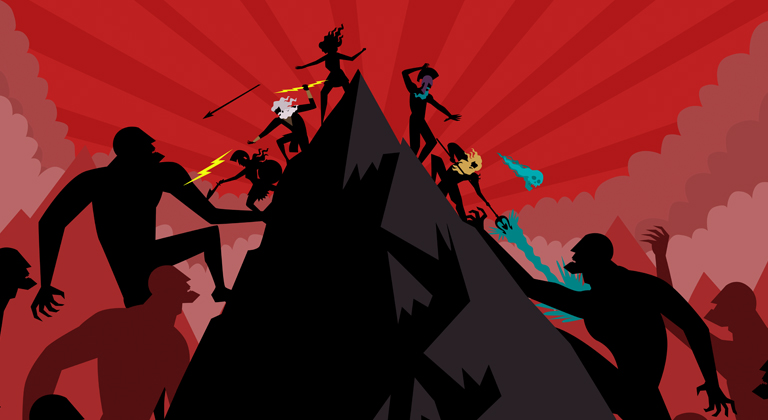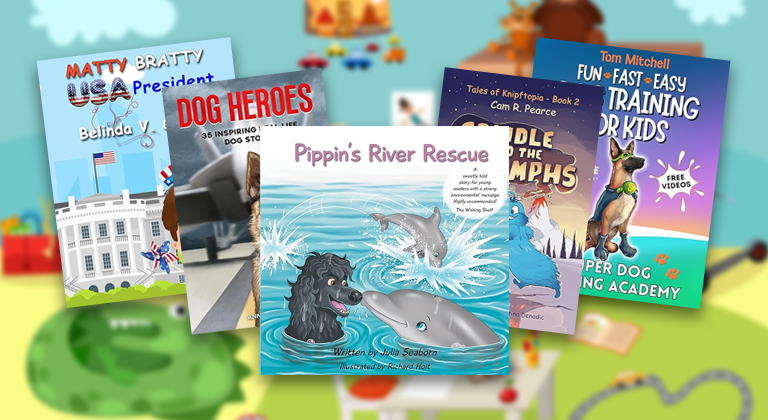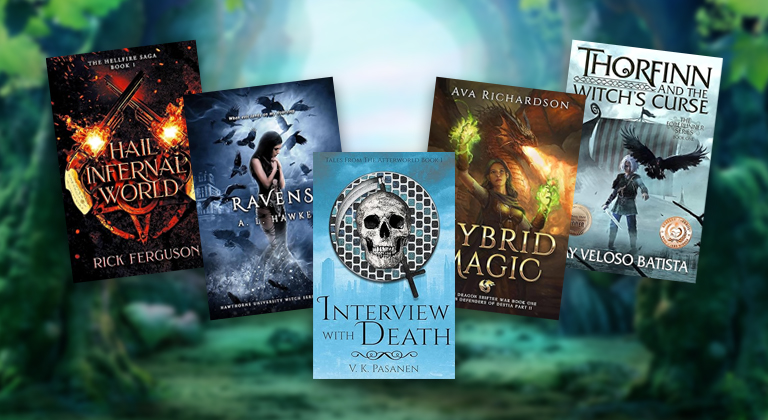What can writers learn from the works of Rick Riordan?
Publishers have long understood how lucrative the young reader market is, and are always anxious to find the next big franchise to build a vast world of marketing and books around, one that can stand the test of time and continue to enchant new generations of readers. When Rick Riordan launched his wildly popular Percy Jackson series back in 2005, they probably knew very quickly that they’d found their mark.
Since then, the series has gone on to sell close to 200 million copies, become a movie, and will soon stream as a television series on Disney+. But what is it about the stories that make them connect so well to their audience? That’s exactly what Ginger is going to break down in today’s blog, as we once again dive deep into the work of a successful author to learn what it is that they are doing right, in the hopes that we can apply those lessons towards improving our own writing.
What can aspiring authors learn by studying the writing of Rick Riordan – the man behind the best-selling and wildly popular Percy Jackson and the Olympians series?
At the turn of the 21st century, publishers desperately sought more authors who’d appeal to young readers in the same way that JK Rowling had with her iconic Harry Potter series. Two of the standouts were Anthony Horowitz, for his spy-inspired Alex Rider series launched in 2000, and Rick Riordan – who exploded into public awareness in 2005 with The Lightning Thief, the first of his mythical Percy Jackson and the Olympians series.
Since then, the five books in Riordan’s series have gone on to sell over 180 million copies worldwide, an was adapted into a moderately successful live-action movie in 2010. Not content with leaving it there, Disney+ are currently developing a streaming TV show based on the series which will premiere in December 2023 – showing that Percy Jackson is still as culturally relevant as ever (and doesn’t come with the same baggage as anything to do with the controversial JK Rowling!)
But what is it that made Rick Riordan’s writing so successful? How is he able to connect with young readers – especially the more difficult-to-reach boys – through his stories? In this article, I’m going to highlight some of the elements that make Riordan’s writing so impactful; and suggest ways in which you can incorporate those elements into your own work.
Using the Power of Mythology
The Percy Jackson series is often compared to the Harry Potter series, for a number of reasons.
One of them is because of the shared use of culturally familiar fantasy elements. In Harry Potter, it was witches and wizards. In Percy Jackson, it’s the broad strokes of Greek mythology – something pretty much everybody has some understanding of, even if they’re not students of literature or history themselves.
And just as JK Rowling did with witches and wizardry, Riordan takes the familiar elements of Greek mythology and breathes new life into them – making them much more accessible and engaging for a modern audience.
In the Percy Jackson series, for example, Riordan delves into Greek mythology by making our protagonist learn that he’s the son of the Greek God Poseidon; a secret kept from him because of how destructive demigods like Percy had the potential to be.
Riordon brings the gods, monsters, and heroes of Greek mythology into the 21st century with this approach, but he also makes them relevant to modern audiences by showing how the themes, conflicts, and characters of Greek lore can still resonate with contemporary readers. For example, Percy’s conflicted relationship with his father is something many young male readers can relate to today, just as the young men would have related to similar themes in ancient times.
Writers can learn from this. Riordon’s use of Greek lore underscores the potential of using old mythology as a foundation for new storytelling. It allows authors to explore universal themes and enduring human experiences in a way that most readers will already feel familiar with.
Creating Relatable and Diverse Characters
Beyond Percy Jackson himself, the characters of the Olympians series are undoubtedly one of the driving forces behind why the books have become so popular – and not because they’re all written to be as loyal and likable as Percy’s best friend Grover.
For example Percy’s stepdad, Gabe Ugliano, is such a loathsome and convincing character that he really makes Percy’s motivations for hating him believable – and explains the decisions Percy makes regarding him! Rick Riordan excels in creating relatable, diverse, and memorable characters that readers can really understand, which is an invaluable lesson for writers seeking to connect with their readers on a deeper level.
Even Percy Jackson, the titular character of his series, is written with depth and relatability. Percy is far from a flawless hero – rather, he’s an everyday teenager with ADHD and dyslexia; two conditions that have make him extremely relatable to many teenage boys.
Yes, Percy is revealed to be a demigod – but he’s still challenged by both those conditions, which impact his choices far more than they might have done in the days of Ancient Greece. By giving Percy two common neurological variances to wrestle with, Riordan offers representation to readers with similar challenges – and also humanizes Percy, making him much more relatable to a wide audience than a superpowered young god would be otherwise.
Rick Riordan’s characters also come from various cultural backgrounds, perhaps because of the books being set in the cultural melting pot of New York, rather than the cozy confines of parochial Great Britain. This diversity also plays into the concept and themes of the series, further enriching the narrative tapestry by allowing Riordan to explore mythology beyond just the confines of Ancient Greece.
In The Kane Chronicles, for example, he introduces readers to Egyptian mythology through the eyes of siblings Carter and Sadie Kane – both of Egyptian ancestry. Their distinct voices and experiences provide a multifaceted perspective on culturally familiar mythology, broadening the appeal of the story.
Without wanting to appear “woke” or writing diversity for the sake of it, authors should strive to create characters that reflect the increased diversity of the real world, both in terms of backgrounds and personalities. This inclusivity not only makes many stories feel more authentic, but it also opens up opportunities for readers of different backgrounds to connect with characters you’ve created who share some of their experiences.
Using Humor in Dark Moments
One of the things Rick Riordan is best known for is his knack for injecting humor into even the most intense and dire situations. Humor is a mainstay of the series – something that many young readers prefer over Harry Potter.
Riordan’s careful balance between humor and tension is a valuable tool that other writers can emulate. It’s extremely powerful – keeping readers engaged and emotionally invested in the story.
In the Percy Jackson series, Percy often uses humor as a coping mechanism when faced with life-threatening challenges. Just like other quick-witted characters like Spiderman, Percy’s humor not only endears him to readers, but also lightens the mood when the stakes are at their highest. For instance, when battling the Minotaur, Percy cracks a witty quip that provides a momentary respite from the tension without diminishing the seriousness of the situation.
But writers can also learn from Riordan how to to use humor strategically, ensuring that it complements the narrative rather than detracts from it. This balance can prevent a story from becoming overly grim or excessively flippant; and create a more enjoyable reading experience for a broader spectrum of readers.
Utilizing Appropriate Voice and Point of View
As we’ve written about before, the point of view a writer decides to use when telling their story is incredibly important. Harry Potter books use the more classical third person perspective – whereas Rick Riordan’s storytelling often employs the first-person perspective, allowing readers to more intimately connect with Percy’s thoughts and emotions. This choice of narrative voice strengthens the reader-character bond and immerses readers more quickly into the story.
For example, Percy Jackson’s first-person narration in The Lightning Thief gives us instant access to his unique voice and perspective. We experience his doubts, fears, and growth firsthand, which makes his hero’s journey all the more compelling. Writing in first person perspective is a powerful technique for writers to employ, particularly when crafting character-driven narratives.
World-Building with a Twist
Rick Riordan’s world-building is another area in which he excels. As I wrote in the first section of this article, he takes familiar mythological elements, and then combines them with familiar settings, such as New York City. Overlaying a familiar world with mythological elements creates a world that is both recognizable and fantastical – similar to how JK Rowling set scenes in the Harry Potter books in the familiar real-world location of King’s Cross Station, in London – but then subverts expectations by introducing a magical element in the form of Platform 9 ¾.
In the Percy Jackson series, it’s Camp Half-Blood that sets the standard for Riordan’s creative world-building. Camp Half-Blood is a summer camp for demigods nestled in the familiar woods of Long Island, and while it appears ordinary to mortals, it’s secretly a hub of mythological activity. This blending of the mundane and the extraordinary is how Riordan creates such immersive settings for his stories.
Although given how the Harry Potter and Percy Jackson series both follow the timeless storytelling approach of Joseph Campbell’s The Hero’s Journey, it’s perhaps not surprising why Riordan and Rowling embrace this approach. It allows their readers to easily relate to the story while still experiencing the wonder of a hidden, magical world; and that’s an approach many authors could learn from.
Aspiring writers can use their techniques to infuse their own stories with a sense of wonder by taking everyday locations and adding unique twists to them, which enhances the narrative. This approach makes it easier for readers to suspend their disbelief and become fully immersed in their magical and fantastical stories.
Embracing Themes of Friendship and Identity
In the first point I made, I mentioned how ancient mythology contains themes that resonate just as much today as they did in ancient times. Two of these themes are friendship and identity – and Rick Riordan’s books often focus on exploring these themes, which is why they often resonate so deeply with his target audience of young readers. Writers can learn from how Riordan tackles these themes in a way that remains both entertaining and thought-provoking.
In the Percy Jackson series, the theme of friendship is central. Percy’s close-knit group of friends, including Annabeth and Grover, face numerous challenges together. Their loyalty and support for each other are heartwarming and remind readers of the importance of friendship in their own lives.
Additionally, the theme of identity is prominent in many of Riordan’s works, not just the Percy Jackson series. Throughout his books, many of his characters grapple with questions of who they are and where they belong. This mirrors the struggles many young readers face as they navigate their own adolescence and seek to understand their place in the world.
Writers can take away from Riordan’s writing the importance of weaving relatable and meaningful themes into their stories, allowing readers to connect with the characters on a deeper level and take away valuable life lessons.
Conclusion
Rick Riordan’s success as a writer goes far beyond his ability to craft entertaining stories. His skill in using mythology, creating relatable characters, infusing humor into dark situations, choosing appropriate narrative voices, world-building, and exploring meaningful themes makes him a true master of the craft of writing.
Aspiring writers can draw valuable lessons from Riordan’s work – using his techniques to craft more compelling and impactful stories. By embracing these elements I’ve written about above, writers will empower themselves to create narratives that not only entertain but also resonate with readers on a profound and emotional level, leaving a lasting impact just as the adventures of Percy Jackson have done on millions of young readers.












Thanks for that excellent analysis, Ginger.